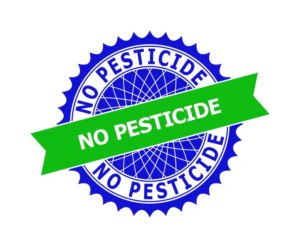Beyond Chemicals: Reclaim Your Garden from Pests & Diseases with Electroculture.
In our quest for flourishing gardens, the allure of quick fixes often leads to reliance on chemical pesticides and fungicides. However, the growing awareness of environmental and health concerns has sparked a shift towards natural and sustainable gardening practices. Electroculture, with its potential to enhance plant immunity and create a pest-resistant environment, offers a promising alternative. This article aims to guide you in reclaiming your garden from pests and diseases, embracing chemical-free methods, and harnessing the power of electroculture for a healthier, more vibrant garden.

Understanding Natural Pest and Disease Management
Soil Health and Plant Immunity: The Foundation of Natural Defense
The health of your garden begins with the soil. A thriving soil ecosystem supports robust plant growth and strengthens natural defenses against pests and diseases. Healthy soil is rich in organic matter, which provides essential nutrients and promotes beneficial microbial activity. A balanced “plant microbiome” is key to strong plant immune systems. Composting is a cornerstone of soil health, transforming kitchen scraps and yard waste into nutrient-rich humus. Mulching helps to retain moisture, suppress weeds, and regulate soil temperature. Regular soil testing can help identify nutrient deficiencies and pH imbalances. Building healthy soil is the first step towards “disease-resistant plants.”
Integrated Pest Management (IPM): A Holistic Approach
Integrated Pest Management (IPM) is a comprehensive strategy that emphasizes prevention and natural controls. Instead of relying solely on chemical pesticides, IPM integrates various techniques to create a balanced ecosystem. Companion planting, for example, involves growing certain plants together to deter pests or attract beneficial insects. Beneficial insects, such as ladybugs and lacewings, prey on common garden pests like aphids and spider mites. Natural pest repellents, like neem oil and insecticidal soap, can be used to control minor infestations. Creating a “natural garden balance” ensures a healthy garden ecosystem.
Natural Fungicides and Insecticides: Safe Alternatives to Chemicals
For minor pest and disease problems, homemade natural fungicides and insecticides can be effective. Baking soda, for instance, can be used to control powdery mildew. Neem oil, derived from the neem tree, is a broad-spectrum insecticide and fungicide. Garlic and chili pepper sprays can also deter pests. “Biological pest control” utilizes living organisms to control pests. For example, Bacillus thuringiensis (Bt) is a naturally occurring bacterium that is effective against caterpillars. For DIY organic fertilizer and pesticide recipes go see this post.
Electroculture and Plant Health: Boosting Natural Defenses
Electroculture and Plant Immunity: Strengthening Cellular Defenses
With Electroculture we can enhance plant immunity by strengthening cellular defenses. Electromagnetic fields stimulate the production of plant defense compounds, such as phytoalexins, which help plants resist pathogens. Electroculture also strengthens plant cell walls, making them more resistant to pest and disease attacks. “Plant defense compounds” are a vital part of plant immunity.
Electroculture and Pest Resistance: Natural Repellents and Disruptions
Electroculture can create an environment that is less hospitable to pests. The presence of copper wire and magnetic fields can disrupt pest behavior and deter them from feeding on plants. Some gardeners have reported that copper wire wrapped around plant stems deters slugs and snails. Magnetic fields also disrupt the navigation and feeding habits of certain insects.
Electroculture and Disease Prevention: Fungal, Bacterial, and Viral Resistance
Electroculture enhances plant resistance to fungal, bacterial, and viral diseases. Electromagnetic fields improve plant nutrient uptake and overall health, making them more resilient to pathogens. Some studies have suggested that electroculture increase the production of plant enzymes that help to break down fungal and bacterial cell walls. Increasing “fungal resistance,” “bacterial resistance,” and “viral resistance” is a key part of disease prevention.
Implementing Electroculture for Pest and Disease Control
Copper Wire and Magnetic Field Techniques: Practical Applications
Pest control and disease prevention happens as a secondary effect of Electroculture. Its main effect being the stimulation of growth and health of the plants. To achieve pest and disease control just use the electroculture method that best suits your garden’s size and situation. For advice on the particular setup to use in your garden go to this page and answer the questions about your setup. This will take you to another page with instruction on what to do according to your answers. Experiment with different configurations and placements to find what works best for your garden.
Electroculture and Soil Vitality: Enhancing Microbial Activity
Electroculture improves soil microbial activity by making more oxygen available to the aerobic bacteria that turn dead matter into humus, enhancing nutrient cycling and creating a more favorable environment for beneficial microorganisms. Combine electroculture with composting and other soil-building techniques to maximize the benefits. A healthy “plant microbiome” is essential for plant health.
Monitoring and Data Tracking: Assessing Electroculture Effectiveness
Monitor plant health and track data to assess the effectiveness of electroculture. Observe plants for signs of pest or disease pressure, such as leaf damage, discoloration, or wilting. Keep records of your observations and compare them to previous years to track your progress. Adjust electroculture techniques accordingly based on your findings. Your recorded data is a valuable resource.
Conclusion:
Electroculture offers a safe and effective alternative to chemical pesticides and fungicides, allowing you to reclaim your garden and create a healthy, thriving ecosystem. By combining electroculture with other sustainable gardening practices, you can minimize your reliance on chemicals and enjoy the benefits of a naturally resilient garden.


